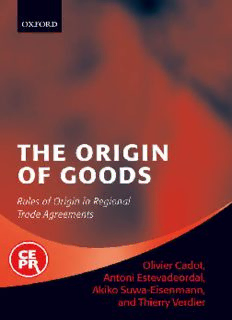
The Origin of Goods: Rules of Origin in Regional Trade Agreements (Centre for Economic Policy Research) PDF
Preview The Origin of Goods: Rules of Origin in Regional Trade Agreements (Centre for Economic Policy Research)
The Origin of Goods Centre for Economic Policy Research (CEPR) TheCentreforEconomicPolicyResearch(CEPR)wasfoundedin1983toenhance the quality of economic policy-making within Europe and beyond, by creating excellent,policy-relevanteconomicresearch,anddisseminatingitwidelytopolicy influencersinthepublicandprivatesectorsandcivilsociety.Asecondgoalwasto unifyandintegratetheEuropeaneconomicsresearchcommunity. CEPRisbasedonanewmodeloforganizationcalleda‘thinknet’:adistributed network of economists who are affiliated with, but not employed by, the Centre, collaboratingthroughCEPRonawiderangeofpolicy-relevantresearchprojectsand dissemination activities. CEPR’s network of Research Fellows and Affiliates com- prisesaround600economists,basedprimarilyinEuropeinuniversitites,research institutes, central bank research departments, and international organizations. No research is performed at CEPR’s London headquarters, which serve a purely administrative function, defining research initiatives with the network, seeking funding,organizingresearch-relatedactivities,such asmeetingsandpublications, andworkingtodisseminatethefindingsofprojectteams. ThisdistinguishesCEPRfromtraditionalthinks-tanks,whichemployresearch- ers directly, and typically take an institutional position. In contrast, CEPR has a pluralist and non-partisan stance: the Centre takes no institutional policy posi- tions, and its publications carry a wide range of policy conclusions and recom- mendations.Theopinionsexpressedinthisbookarethoseoftheauthorsandnot necessarilythoseofCEPRoritssupportingfunders. Chairman GuilermodelaDehesa President RichardPortes ChiefExecutiveOfficer StephenYeo ResearchDirector MathiasDewatripont CentreforEconomicPolicyResearch 90–98GoswellRoad LondonEC1V7RR UK Tel: þ44(0)2078782900 Fax: þ44(0)2078782999 Email:[email protected] Website:www.cepr.org The Origin of Goods Rules of Origin in Regional Trade Agreements Edited by Olivier Cadot Antoni Estevadeordal Akiko Suwa-Eisenmann and Thierry Verdier 1 AC GreatClarendonStreet,OxfordOX26DP OxfordUniversityPressisadepartmentoftheUniversityofOxford. ItfurtherstheUniversity’sobjectiveofexcellenceinresearch,scholarship, andeducationbypublishingworldwidein Oxford NewYork Auckland CapeTown DaresSalaam HongKong Karachi KualaLumpur Madrid Melbourne MexicoCity Nairobi NewDelhi Shanghai Taipei Toronto Withofficesin Argentina Austria Brazil Chile CzechRepublic France Greece Guatemala Hungary Italy Japan Poland Portugal Singapore SouthKorea Switzerland Thailand Turkey Ukraine Vietnam OxfordisaregisteredtrademarkofOxfordUniversityPress intheUKandincertainothercountries PublishedintheUnitedStates byOxfordUniversityPressInc.,NewYork #CEPR,2006 Themoralrightsoftheauthorhavebeenasserted DatabaserightOxfordUniversityPress(maker) Firstpublished2006 Allrightsreserved.Nopartofthispublicationmaybereproduced, storedinaretrievalsystem,ortransmitted,inanyformorbyanymeans, withoutthepriorpermissioninwritingofOxfordUniversityPress, orasexpresslypermittedbylaw,orundertermsagreedwiththeappropriate reprographicsrightsorganization.Enquiriesconcerningreproduction outsidethescopeoftheaboveshouldbesenttotheRightsDepartment, OxfordUniversityPress,attheaddressabove Youmustnotcirculatethisbookinanyotherbindingorcover andyoumustimposethesameconditiononanyacquirer BritishLibraryCataloguinginPublicationData Dataavailable LibraryofCongressCataloginginPublicationData Dataavailable TypesetbyNewgenImagingSystems(P)Ltd.,Chennai,India PrintedinGreatBritain onacid-freepaperby BiddlesLtd.,King’sLynn,Norfolk ISBN0–19–929048–2 978–0–19–929048–2 10 9 8 7 6 5 4 3 2 1 Acknowledgments TheinitialideaofaconferenceandeditedvolumeonRulesofOrigingoes back several years when Robert Devlin, then Deputy Manager at the Integration and Regional Programs Department of the Inter-American Development Bank (IDB), encouraged and enthusiastically supported researchonwhatseemedatthetimeanarcanetopic,ofinterestonlytoa handfulofspecialists.Itisatestimonytotheinitiative’sachievementthat thetopicisnotarcaneanymore. Finalplansforthetwoconferencesinwhichtheessayscollectedinthis volume were discussed were drawn up between the Integration and Regional Programs Departmentof the IDB in Washington, D.C. and two leading research centers and networks in Europe, the Department and Laboratory of Applied and Theoretical Economics (DELTA) and the London-based Center for Economic Policy Research (CEPR). The first conference,heldatParis-JourdanCampusinParisinMay–June2003,was organized by INRA and sponsored by the IDB, DELTA, CEPR, INRA, Fe´de´ration Paris-Jourdan and ADRES. The second and final one, held in Washington, D.C. in February 2004, was organized and sponsored by theIDB. Ourdebts,aseditors,are multiple.Firstandforemost, theenthusiastic supportshown,fromtheoutset,byallsponsorsgreatlyhelpedustocarry this project forward to successful completion. In particular, the Inter- American Development Bank’s financial contribution through its inte- gration and Regional Programs department was outstandingly generous. Several individuals stand out for their support and encouragement: in particular Nohra Rey de Marulanda, Robert Devlin, and Carlo Binetti at theIDB,andStephenYeoattheCEPR. Second, our thanks go to all authors, whose combined efforts and commitment made this book possible. Special thanks are also due to Martha Skinner and Ziga Vodusek at the IDB as well as Madeleine Roux and Beatrice Havet at INRA for their effort and commitment in the organizationofthetwoconferences.Fortheircriticalcontributiontothe v Acknowledgments finalconferenceanditsinvaluableimpactonthequalityofthepapersin this volume, we would also like to thank the distinguished team of discussants: Rafael Cornejo (IDB); Michael Ferrantino (USITC); Jeremy Harris(IDB);BernardHoekman(WorldBank);StefanoInama(UNCTAD); WilliamJames;MariaMayda(GeorgetownUniversity);MarceloOlarreaga (World Bank); Antonio Spilimbergo (IMF); Brian Staples (Trade Facilita- tion Services, Ottawa) and Robert Teh (WTO). Last but not least, the processofproducingabookgoesbeyondthetechnicalcompetenceofthe authors. We are deeply grateful for the skilled work of all involved, in particular,JenniferWilkinson,AssistantCommissioningEditorandCarol Bestley,ProductionEditoratOxfordUniversityPress. Theviewsexpressedinthesepapersaresolelythoseoftheauthors,and theydonotrepresenttheviewsoftheinstitutionstheyareaffiliatedwith. O.C. A.E. A.S.-E. T.V. vi Contents ListofFigures ix ListofTables x ListofContributors xii Introduction 1 Olivier Cadot, Antoni Estevadeordal, Akiko Suwa-Eisenmann, and Thierry Verdier Part I. Rules of Origin: Theoretical perspectives 17 1 Understanding Rules of Origin 19 Kala Krishna 2 The impact of Rules of Origin on strategic outsourcing: an IO perspective 35 Mathias Thoenig and Thierry Verdier Part II. Rules of Origin in Regional Trade Agreements around the world 67 3 Mapping and measuring Rules of Origin around the world 69 Antoni Estevadeordal and Kati Suominen 4 Rules of Origin for services: economic and legal considerations 114 Americo Beviglia Zampetti and Pierre Sauve´ Part III. The political economy of Rules of Origin 147 5 Rules of Origin as export subsidies 149 Olivier Cadot, Antoni Estevadeordal, and Akiko Suwa-Eisenmann vii Contents 6 Rules of Origin and US trade policy 173 I.M. (Mac) Destler Part IV. Measuring the impact of Rules of Origin 189 7 Are different Rules of Origin equally costly? Estimates from NAFTA 191 Ce´line Carre`re and Jaime de Melo 8 Implementing PTAs in the Southern Cone region of Latin America: Rules of Origin 213 Pablo Sanguinetti and Eduardo Bianchi 9 Preferential trade arrangements production, and trade with differentiated intermediates 237 Joseph Francois Part V. Rules of Origin and development 257 10 Rules of Origin as tools of development? Some lessons from SADC 259 Hennie Erasmus, Frank Flatters, and Robert Kirk 11 Trade preferences for Africa and the impact of Rules of Origin Paul Brenton and Takako Ikezuki 295 Index 315 viii List of Figures 1 Verticaltradeinatwo-stageframework 4 2 Theeffectoftariffpreferences 5 3 TariffpreferencesandRoOcombined 6 4 PSROrestrictivenessandregime-widefacilitation,selectedPTAs 10 1.1 PhysicalcontentRoOandcosts 25 1.2 Demand,priceandcostinanFTA 27 2.1 Reactioncurveofoutsourcing 40 2.2 Nashequilibriuminoutsourcing 41 2.3 Profitfunctions 44 2.4 ReactioncurveundertheRoO 45 2.5 (a)Someusefulnotations;(b)EquilibriumwithabindingRoO; (c)MultipleequilibriainoutsourcingwithRoO 46 2.6 EffectsofRoOonprofits 48 2.7 Equilibriumintheno-RoOregime 56 2.8 EffectofaRoOonlocalsupplier’sinvestment 59 2.9 EffectofaRoOonmonopoly’soutputandprofit 60 2.10 PositiveeffectofaRoOonequilibrium 61 2.11 PerverseeffectofaRoOonequilibrium 62 3.1 DistributionofCTCcriteriabyagreement 82 3.2 RestrictivenessofRoOinselectedPTAs 94 3.3 FacilitationindexforselectedPTAs 97 9.1 Turkey’smotorvehicleexportstoGermany 251 9.2 Mexico’sautoexportstotheUS 251 ix
Description: